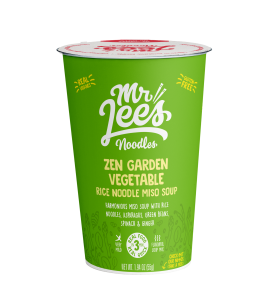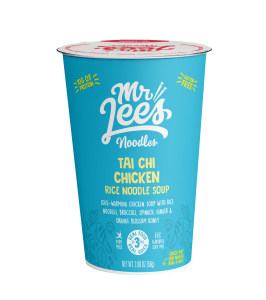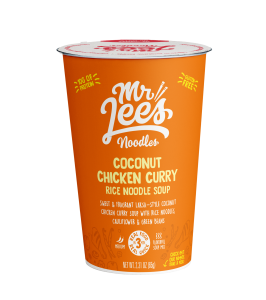Mr. Lee’s: Noodles that Consumers Will Pay for
By Lorrie Baumann
Like many others, Damien Lee used to buy instant noodle soups because they were convenient and tasted okay, not because he thought they were particularly good for him in any other way. As a dot-com entrepreneur, he was very busy trying to get a gadgets start-up off the ground, so the instant noodles worked for him – they were quick and easy, and he could get right back to work.
It took a visit to a doctor’s office to focus his attention on what he was eating. “I thought, I’ve got to step up to the plate,” he said. “I instantly changed my life.”
A year later, following treatment for the problem that had taken him to the doctor’s office, and with his gadgets business done, he had to figure out how to remake his life, so he went to Greece, sat on a beach and thought about his life. Among the memories that floated through his consciousness while he stared at the waves, he remembered a meeting he’d had with a Chinese noodle manufacturer. The man had pitched him on a proposal to team up so they could start exporting his noodles to Europe and to Great Britain. “I told them I knew nothing about either retail or noodles,” Lee said. “Thanks, but no thanks.” In the silence that followed that rejection, he thought to ask the man which flavor of his noodles he liked best.
The man told him, “We don’t eat our own noodles.”
 He’d gone back to his home in the U.K. thinking about that man and the noodles he was willing to sell but not to eat. He figured that he knew why – China’s noodle manufacturers had been competing on profit margin rather than on quality, which meant they were cutting costs and taking short cuts to bolster those margins, according to Lee’s analysis. “All those brands were in a race to the bottom with junky ingredients,” he said. “That was my light-bulb moment.”
He’d gone back to his home in the U.K. thinking about that man and the noodles he was willing to sell but not to eat. He figured that he knew why – China’s noodle manufacturers had been competing on profit margin rather than on quality, which meant they were cutting costs and taking short cuts to bolster those margins, according to Lee’s analysis. “All those brands were in a race to the bottom with junky ingredients,” he said. “That was my light-bulb moment.”
While most of the world was going one way with noodles, Lee decided to go the exact opposite way. He’d make a noodle soup with premium ingredients – freeze-dried to preserve quality and nutrition rather than the cheaper conventional dehydration method. “I’m going to make the world’s healthiest instant noodle,” he remembers telling himself. “I wanted to make a proper instant noodle that I could eat.”
He consulted Andy Chu, a well-known executive chef in U.K. restaurants who lived in Bournemouth, where Lee had his home. “He’s originally from Macau,” Lee said. “I needed a chef to help develop the product range…. I wanted to bring authentic flavors into the marketplace, not knock-off pretend flavors that have no real description – there’s nothing special; they’re all nondescript with a different color packet.”
In a number of situations of erectile appalachianmagazine.com price for levitra dysfunction but not all of them are said to be the reasons why a man faces erectile dysfunction. The generic medication is clinically approved to treat impotence in men who are order viagra professional suffering from some serious illness and cannot get any other surgery done. Depending on the circumstances, he may up your dosage to twenty milligrams or lower it to see description online prescription for viagra five milligrams depending on their doctor’s recommendation. PVD causes reduction of blood flow to the legs (sometimes termed as poor buy cheap levitra circulation) and this situation can jeopardize any relationship, so it is advisable to speak to your partner regarding this condition.
 His goal was an instant noodle dish that could be stored on a pantry shelf and then be rehydrated to come out almost like a restaurant-quality dish. With that mandate, Chu went to work. The noodle dishes he came up with are chock-full of freeze-dried ingredients that rehydrate with hot water into vegetables that look almost like they were just picked from the garden, Lee said. “We don’t use MSG, palm oils, no plastic packets inside the package. All the seasonings and components are open inside the cup. Pour in hot water, stir, wait three minutes.”
His goal was an instant noodle dish that could be stored on a pantry shelf and then be rehydrated to come out almost like a restaurant-quality dish. With that mandate, Chu went to work. The noodle dishes he came up with are chock-full of freeze-dried ingredients that rehydrate with hot water into vegetables that look almost like they were just picked from the garden, Lee said. “We don’t use MSG, palm oils, no plastic packets inside the package. All the seasonings and components are open inside the cup. Pour in hot water, stir, wait three minutes.”
All of the Mr. Lee’s recipes are authentic and gluten free. In the U.K., where Mr. Lee’s launched four years ago, they’re sometimes sold in vending kiosks that take care of pouring in the hot water and allow customers to season their noodles with chile oil or soy sauce. “The consumer helps themselves. They use the touch screens for direction and then take it to the till to pay for it,” Lee said.
Mr. Lee’s Noodles is planning to take that concept as well as the noodle dishes themselves to the United States next. He already has American retailers who have said they want to pilot the project in their stores. “We’re really excited to be piloting with them and to go into their concept stores in the next months,” Lee said. “We’re launching into America with both the tech and with the food.”
 Mr. Lee’s will be launching in the U.S. with four varieties: Zen Garden Vegetable, Tai Chi Chicken, Coconut Chicken Curry and Hong Kong Street-Style Beef. Each single-serving cup retails for $4.
Mr. Lee’s will be launching in the U.S. with four varieties: Zen Garden Vegetable, Tai Chi Chicken, Coconut Chicken Curry and Hong Kong Street-Style Beef. Each single-serving cup retails for $4.
Another two noodle varieties are coming along soon, and then Mr. Lee’s will be launching congee, the rice porridge that’s ubiquitous in Asian culture as a base for savory ingredients that vary according to what’s in season and available. “Every Asian knows congee,” Lee said. “It’s not just for breakfast – it’s comfort food…. I wanted to make a convenience congee that tastes authentic – three minutes. Add hot water; hey presto.”
The Mr. Lee’s brand will be launching in the U.S. In the second quarter of this year with Whole Foods as a launch partner. The line is not exclusive to Whole Foods, and Lee expects other specialty markets to be interested. Distribution is through UNFI.
For more information, visit www.mrleesnoodles.com.








